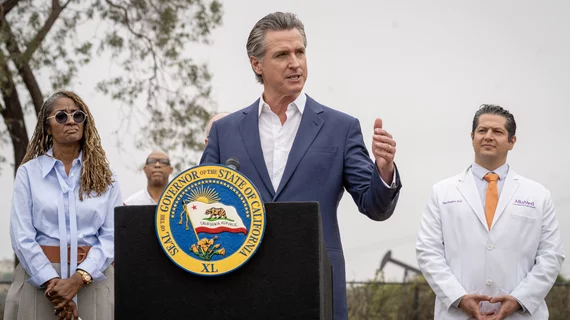Governor vetoes bill to increase scrutiny of private equity physician practice purchases
California Gov. Gavin Newsom (D) has vetoed a bill that would add more scrutiny when private equity firms and hedge funds acquired physician practices or other healthcare entities.
State lawmakers previously passed Assembly Bill 3129 on Aug. 31, advancing the legislation to the governor’s desk for consideration. Newsom issued his final decision Sept. 28 along with two dozen other vetoes.
The bill would have given the state attorney general power to impose conditions on the acquisition of radiology groups or other healthcare entities. This would apply in cases where authorities believe a PE or hedge fund investment would have “anticompetitive effects or negatively impact access or availability of healthcare services to the community.” Assembly Bill 3129 also would reinforce the bar on the corporate practice of medicine, providing a “fundamental protection” against the “public danger that medical care could be subject to commercial exploitation.”
In his veto letter, Newsom noted that the Office of Health Care Affordability was established in 2022 to review and evaluate transactions that might have a significant impact on market competition. While the office cannot block a proposed transaction, it can coordinate with other entities to initiate deeper scrutiny.
“I appreciate the author’s continued efforts and partnership to increase oversight of California’s healthcare system in an effort to ensure consumers receive affordable and quality healthcare,” Newsom wrote. “However, OHCA was created as the responsible state entity to review proposed healthcare transactions, and it would be more appropriate for the OHCA to oversee these consolidation issues as it is already doing much of this work. For these reasons, I cannot sign this bill.”
California Assembly Member Jim Wood had sponsored the bill alongside Attorney General Rob Bonta. The two expressed disappointment Sept. 30. Wood noted that annual private equity investment in healthcare reached $83 billion three years ago, with $20 billion spent in California alone. However, these transactions have faced little scrutiny to ensure they are in the public’s best interest, he contends, often “flying totally under the radar.”
“Today is a sad day for healthcare consumers,” Wood, a Healdsburg Democrat, said in a statement. “When we look across the nation, we see private equity’s encroachment into healthcare growing by leaps and bounds and I had hoped California would be the first state to provide a preventive and reasonable initial review to protect healthcare consumers from being the victims of profit-driven investors who are not interested in ensuring that Californians get quality care where they need it and at an affordable price.”
A coalition of business interests in August urged the state assembly to reject the bill. Those opposing it have included the California Chamber of Commerce, California Association of Health Facilities, California Urgent Care Association, the National Venture Capital Association, and private equity-backed psychiatry provider Mindpath Health. They had contended that the measure would “stifle” free market transactions.
“AB 3129 threatens the private investment and partnerships that are helping drive innovation and expand access to care,” the coalition said in an Aug. 21 letter to the state Senate. “Private investment has helped dental practices expand access to care to more underserved children; helped thousands of physicians by providing administrative and back-office support; enabled access to reproductive treatment with greater convenience and support; and funded outpatient clinics, oncology clinics, long-term care, urgent care, dental care, behavioral health, and other medical care that have strengthened our health system and improved patients’ lives.”

